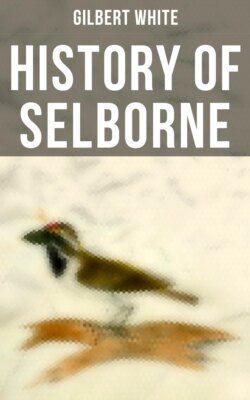Читать книгу History of Selborne - Gilbert White - Страница 12
На сайте Литреса книга снята с продажи.
LETTER VII.
ОглавлениеTable of Contents
Though large herds of deer do much harm to the neighbourhood, yet the injury to the morals of the people is of more moment than the loss of their crops. The temptation is irresistible; for most men are sportsmen by constitution: and there is such an inherent spirit for hunting in human nature, as scarce any inhibitions can restrain. Hence, towards the beginning of this century all this country was wild about deer-stealing. Unless he was a hunter, as they affected to call themselves, no young person was allowed to be possessed of manhood or gallantry. The Waltham blacks at length committed such enormities, that Government was forced to interfere with that severe and sanguinary act called the “Black Act,” which now comprehends more felonies than any law that ever was framed before. And, therefore, a late Bishop of Winchester, when urged to re-stock Waltham Chase, refused, from a motive worthy of a prelate, replying “that it had done mischief enough already.”
Our old race of deer-stealers is hardly extinct yet: it was but a little while ago that, over their ale, they used to recount the exploits of their youth; such as watching the pregnant hind to her lair, and, when the calf was dropped, paring its feet with a penknife to the quick to prevent its escape, till it was large and fat enough to be killed; the shooting at one of their neighbours with a bullet in a turnip-field by moonshine, mistaking him for a deer; and the losing a dog in the following extraordinary manner: Some fellows, suspecting that a calf new-fallen was deposited in a certain spot of thick fern, went, with a lurcher, to surprise it; when the parent-hind rushed out of the brake, and, taking a vast spring with all her feet close together, pitched upon the neck of the dog, and broke it short in two.
Another temptation to idleness and sporting was a number of rabbits, which possessed all the hillocks and dry places: but these being inconvenient to the huntsmen, on account of their burrows, when they came to take away the deer, they permitted the country people to destroy them all.
Such forests and wastes, when their allurements to irregularities are removed, are of considerable service to neighbourhoods that verge upon them, by furnishing them with peat and turf for their firing; with fuel for the burning their lime; and with ashes for their grasses; and by maintaining their geese and their stock of young cattle at little or no expense.
The manor farm of the parish of Greatham has an admitted claim, I see (by an old record taken from the Tower of London) of turning all live stock on the forest, at proper seasons, “bidentibus exceptis.” The reason, I presume, why sheep are excluded, is because, being such close grazers, they would pick out all the finest grasses, and hinder the deer from thriving.
Though (by statute 4 and 5 W. and Mary, c. 23) “to burn on any waste, between Candlemas and Midsummer, any grig, ling, heath and furze, goss or fern, is punishable with whipping and confinement in the house of correction;” yet, in this forest, about March or April, according to the dryness of the season, such vast heath-fires are lighted up, that they often get to a masterless head, and, catching the hedges, have sometimes been communicated to the underwoods, woods, and coppices, where great damage has ensued. The plea for these burnings is that, when the old coat of heath, etc., is consumed, young will sprout up, and afford much tender browze for cattle; but, where there is large old furze, the fire, following the roots, consumes the very ground; so that for hundreds of acres nothing is to be seen but smother and desolation, the whole circuit round looking like the cinders of a volcano; and, the soil being quite exhausted, no traces of vegetation are to be found for years. These conflagrations, as they take place usually with a north-east or east wind, much annoy this village with their smoke, and often alarm the country; and, once in particular, I remember that a gentleman, who lives beyond Andover, coming to my house, when he got on the downs between that town and Winchester, at twenty-five miles’ distance, was surprised much with smoke and a hot smell of fire, and concluded that Alresford was in flames; but, when he came to that town, he then had apprehensions for the next village, and so on to the end of his journey.
On two of the most conspicuous eminences of this forest stand two arbours or bowers, made of the boughs of oak; the one called Waldon Lodge, the other Brimstone Lodge: these the keepers renew annually on the feast of St. Barnabas, taking the old materials for a perquisite. The farm called Blackmoor, in this parish, is obliged to find the posts and brush-wood for the former; while the farms at Greatham, in rotation, furnish for the latter, and are all enjoined to cut and deliver the materials at the spot. This custom I mention, because I look upon it to be of very remote antiquity.
